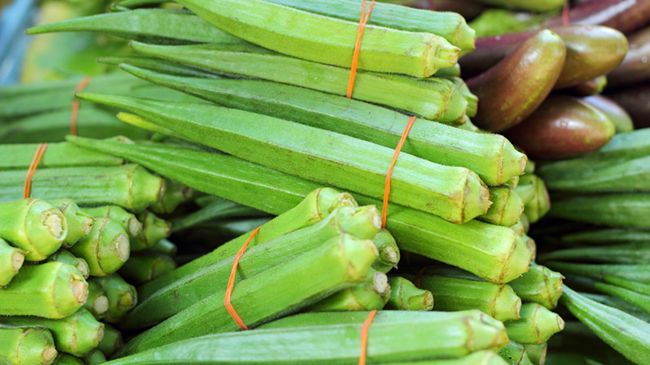
A tropical plant, it grows best in warm climates and is available year-round with a peak season in the summer. It is cultivated for its green seed pods that grow rapidly and ready for harvest in about 60 days. Internally, the pods feature small, round, mucilaginous white colored seeds arranged in vertical rows. The tender, unripe seed pods have a unique texture and bittersweet flavor. It can be consumed raw or marinated but mostly used as a thickening agent in stews and soups like gumbo.
What makes okra so special?
Okra is a powerhouse vegetable with varying amounts of nutrients, dependent upon how it is consumed, but the more prominent ones and their amounts according to the USDA are below, based on one cup of okra:
- Fiber – 2.5 grams. 10% of RDA (recommended daily value”>
- Vitamin C – 16.3 milligrams. 27% RDA
- Folate – 46 micrograms. 11% RDA
- Vitamin A – 283 international units. 6% RDA
- Vitamin K – 40 micrograms. 50% RDA
- Niacin (Vitamin B3″> – 0.9 mg. 4% RDA
- Thiamin (Vitamin B1″> – 0.1 mg. 9% RDA
- Vitamin B6 – 0.2 mg. 9% RDA
- Magnesium – 36 mg. 9% RDA
- Manganese – 0.3 mg. 15% RDA
- Beta carotene – 225 mcg
- Lutein, Zeaxanthin – 516 mcg
What are the health benefits of okra?
The list above is impressive and explains the interest many have in okra for health. It is rich in several nutrients, minerals, and vitamins that benefit our bodies. It is one of the vegetables with the highest amounts of vitamin A, flavonoid anti-oxidants like beta-carotene. It supports colon-health, reduces the risks for diabetes, helps with respiratory issues, and promotes healthy skin and hair. It also promotes eye health, protects against free radicals, and even helps with constipation.
the mucilage from okra is a natural asset better than any detangler on the shelves that will cost more.
What can okra do for my hair?
It can do more than one would think! Many use okra for detangling, increasing shine, and soothing the scalp. Add to those benefits the imparting of vitamins, minerals, and nutrients and you can see why adding okra to your repertoire is an excellent idea. Many vegetables produce mucilage, a thick gluey substance formed by large polysaccharides and okra is no exception.
When applied to skin, mucilage acts as an emollient and when applied to hair it provides massive slip for manageable and highly effective detangling. When reacted with water, mucilage reduces friction between the strands and moves through the hair fibers with ease. It can be used as a hair rinse to add shine to dull strands along with adding bounce and movement. When it comes to making hair smoother and more manageable, the mucilage from okra is a natural asset better than any detangler on the shelves that will cost more.
Some use it as a hair gel while others use it as a conditioner. Either way will yield the same results of softer, smoother, less tangled tresses.
Read more: DIY Okra Gel Detangling Pre-poo
